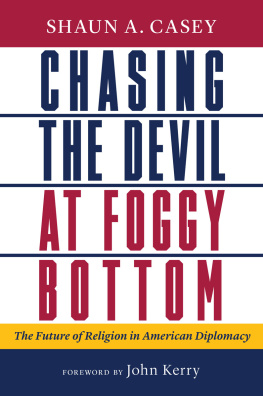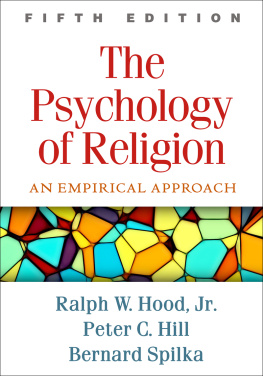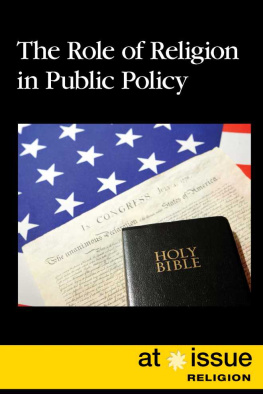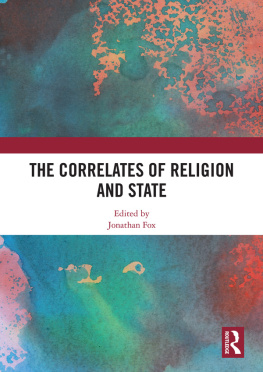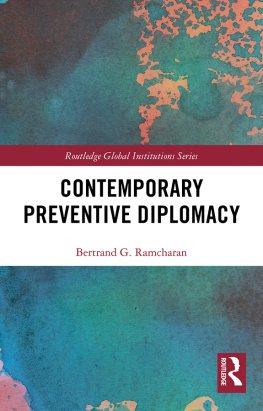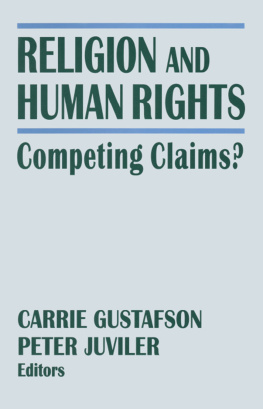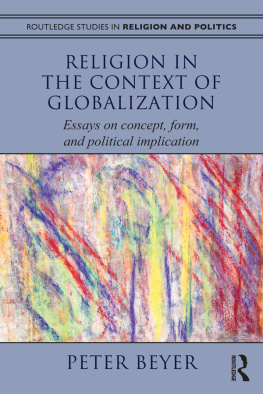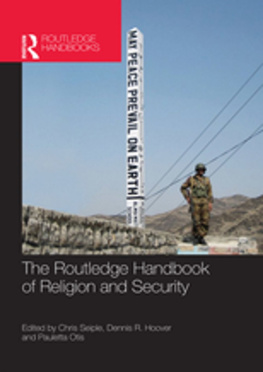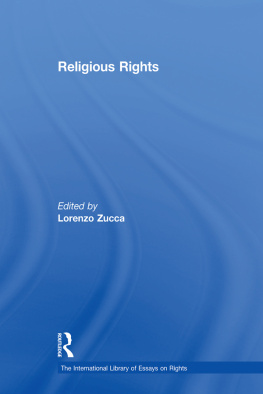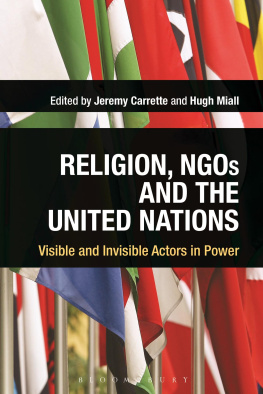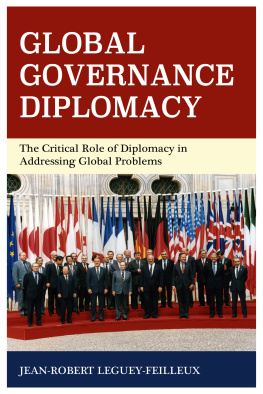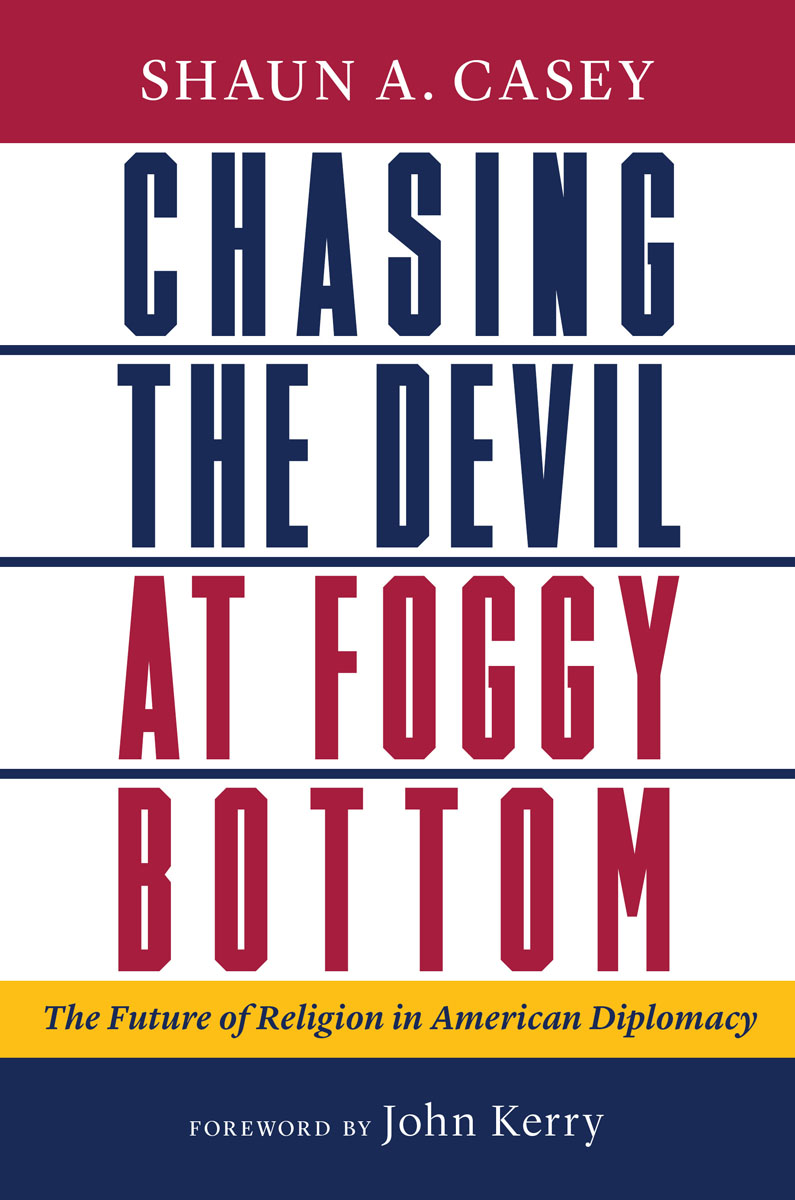

Wm. B. Eerdmans Publishing Co.
4035 Park East Court SE, Grand Rapids, Michigan 49546
www.eerdmans.com
2023 Shaun A. Casey
All rights reserved
Published 2023
Printed in the United States of America
29 28 27 26 25 24 23 1 2 3 4 5 6 7
ISBN 978-0-8028-8170-0
Library of Congress Cataloging-in-Publication Data
A catalog record for this book is available from the Library of Congress.
The opinions and characterizations in this piece are those of the author and do not necessarily represent those of the US government.
To my beloved Ann
C ONTENTS
F OREWORD
T HE LIST OF LIFELONG EXPERTS WHO CAN give a stirring tutorial on foreign policy is extensive. So is the universe of scholars who can cite sacred texts about religion, comparative and otherwise. But for many years, there was a sort of separation of church and state(craft)quite literally. The worlds stayed largely separatean irony, and a failure of imagination, in a world in which it is nigh impossible to understand either sphere sufficiently without grasping the interconnectedness of the two and the religious convictions, conflicts, and controversies at the heart of societies and peoples everywhere.
This is the difficulty that motivated Dr. Shaun Casey to lend his expertise to try to bridge these two worldsand that is the journey Shaun retells eloquently and informatively, the work at the center of Chasing the Devil at Foggy Bottom: The Future of Religion in American Diplomacy .
Ive known Shaun for nearly two decades, back to his time at Wesley Theological Seminary, when together we were thought partners contemplating ways to make religion a unifying tool rather than a cause of division in public dialogue. He played a similar role with me during my years as Chairman of the Senate Foreign Relations Committee, exploring new ways to engage religion as an effective tool in foreign policy. This was, of course, the path that ultimately brought Shaun into government on a formal basis, when he joined us at the State Department as the inaugural head of the Office of Religion and Global Affairs.
Shauns academic expertise speaks for itself. But his passion for foreign policy and his willingness to wrestle with the complexity of sectarian differences to bridge gaps between the worlds religions revealed a practitioner as patient as he was persistent. I was struck by Shauns eagerness to debate and differ and push hard not to find the lowest common denominator, surface-level insights, but to really wrestle with tough issuesthe history of Western involvement in the Muslim world, the Sunni-Shia split, and religious extremismto actually find ways to advance dialogue.
These were, of course, qualitiestenacity and curiosity in particularthat prepared him well for life managing a new enterprise in the State Department, a formidable bureaucracy and an alphabet soup of acronyms and abbreviations for undersecretaries, bureaus, and special offices. It can be a lot to process for newcomers and an impossible task for many academics. To this vast enterprise, Shaun brought an often-unappreciated skill: he listened. Whether it was in the course of intransigent negotiations in Cuba, or in engagements across the Middle East and Africa, he soon became an adept thinker as well as operator. If his calling hadnt been religion, diplomacy might well have been a natural fit.
Now, in the pages of this book, we will all benefit from Shauns expertise and perspective.
J OHN F. K ERRY
68th Secretary of State
A CKNOWLEDGMENTS
I OWE MY FIRST AND DEEPEST THANKS to my family. I am grateful to my wife Ann for so much: for her love, her counsel, her wisdom, and for forty years of marriage. To my son Paul and daughter Sarah I am grateful for their manifold gifts, which continue to astound me. Pauls keen editorial advice was particularly helpful when I was stymied about how to organize the story. Sarahs unexpected and unplanned return home during the pandemic to finish her graduate work at Harvard Divinity School remotely provided me innumerable hours to pick her brain as the book progressed. And I lost my ninety-nine-year-old mother in the COVID pandemic as I was nearing completion of the manuscript. I owed so much to her and my late father.
I am thankful for the trust Secretary of State John Kerry showed to me when he hired me as special representative for religion and global affairs at the US Department of State. Without his trust this story would never have taken place. I am also deeply grateful to David Wade, Kerrys chief of staff, whose wise counsel and friendship paved our way to success on a daily basis.
I remain amazed and grateful for the extraordinary team we were able to build at the Office of Religion and Global Affairs. I owe my deepest gratitude to Liora Danan, our chief of staff, whose impact can be seen throughout the pages of this book. Others include Ira Forman, Arsalan Suleman, and Shaarik Zafar; Toiyriah Turner, Amy Lillis, Rachel Leslie, Claire Sneed, Rebecca Linder Blachly, Albar Sheikh, Rustum Nyquist, Laterica Curtis, Jennifer Wistrand, Alice Bean, Evan Berry, David Buckley, Jerome Copulsky, Priscilla Flores, Usra Ghazi, Michael Hamburger, Qamar-Ul Huda, Holly Robertson Huffnagle, Mariam Kaldas, Helene Kessler, Alan Matney, Peter Mandaville, Julianne Paunescu, and Maryum Saifee.
The team at Eerdmans has been extraordinary. I am especially grateful to my editor Trevor Thompson, who immediately grasped the gist of this book in a manner that many of his fellow editors at several other presses were unable to do. Likewise, James Ernest, editor-in-chief, and Anita Eerdmans, president, also enthusiastically embraced the project. I want to thank my very talented and intrepid research assistants at Georgetown University: Rosalie Daniels, Julia Friedman, Madelyn Coles, and Madeline Hart.
At the end of a book project like this I am keenly aware of the multitude of people over the years who have shaped who I am and what I have been able to do. I have resisted the urge to give a lengthy recitation of their names. I am also aware of the stories I could have told but chose not to tell. Some of these omissions protect the innocent; others protect the guilty. There were so many things to tell and only so much space to do so. I will let Augustines concluding words to The City of God suffice:
And now, as I think, I have discharged my debt, with the completion, by Gods help, of this huge work. It may be too much for some, too little for others. Of both these groups I ask forgiveness. But of those for whom it is enough I make this request: that they do not thank me, but join with me in rendering thanks to God. Amen. Amen.
Chapter One
V OTE-A- R AMA
S ENATOR J OHN K ERRY LOOKED OVER THE TOP of his reading glasses, trained his eyes on me as he slapped his weather-beaten diary closed, and asked, How can I tell a story like this in public?
He had just finished reading me a long passage from his journal, written the night he learned his friend and Yale classmate Richard Pershing had been killed in combat in Vietnam. Pershing died on February 17, 1968, during the Tet offensive, on a mission to recover the body of one of his soldiers who died in a firefight the day before. Kerry was barely twenty-four years old when he got the news of Pershings death.
At this point in 2005 I did not know Senator Kerry well enough to know just how much spiritual and theological substance there might actually have been to the man, to say nothing of his grasp of religion around the globe. Most of what I knew about him was drawn from press descriptions of his faith during the 2004 presidential election, and those accounts were uniformly tepid, even hostile. Yet he had just given me evidence to suggest the real story was much more interesting.
Next page
